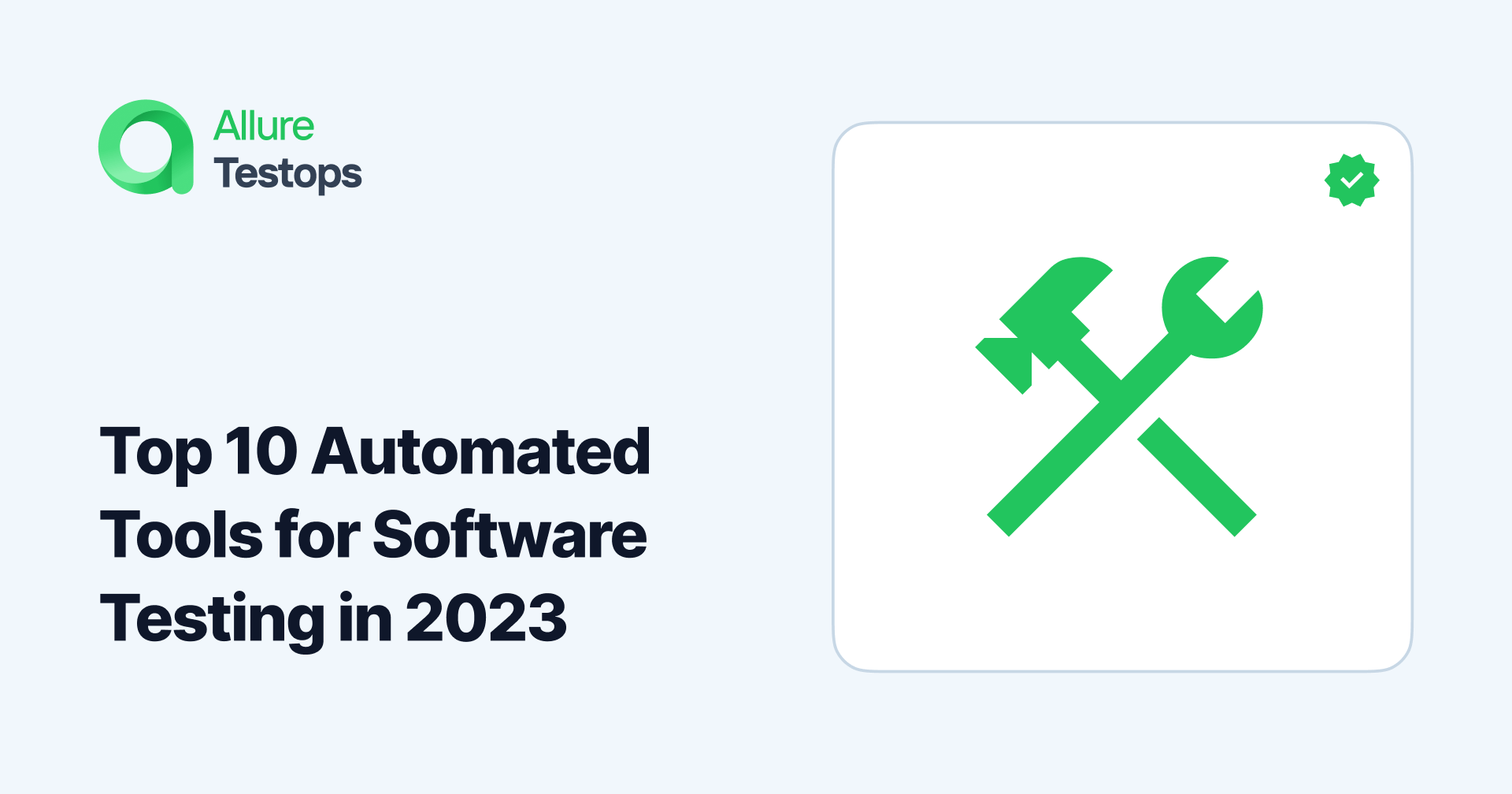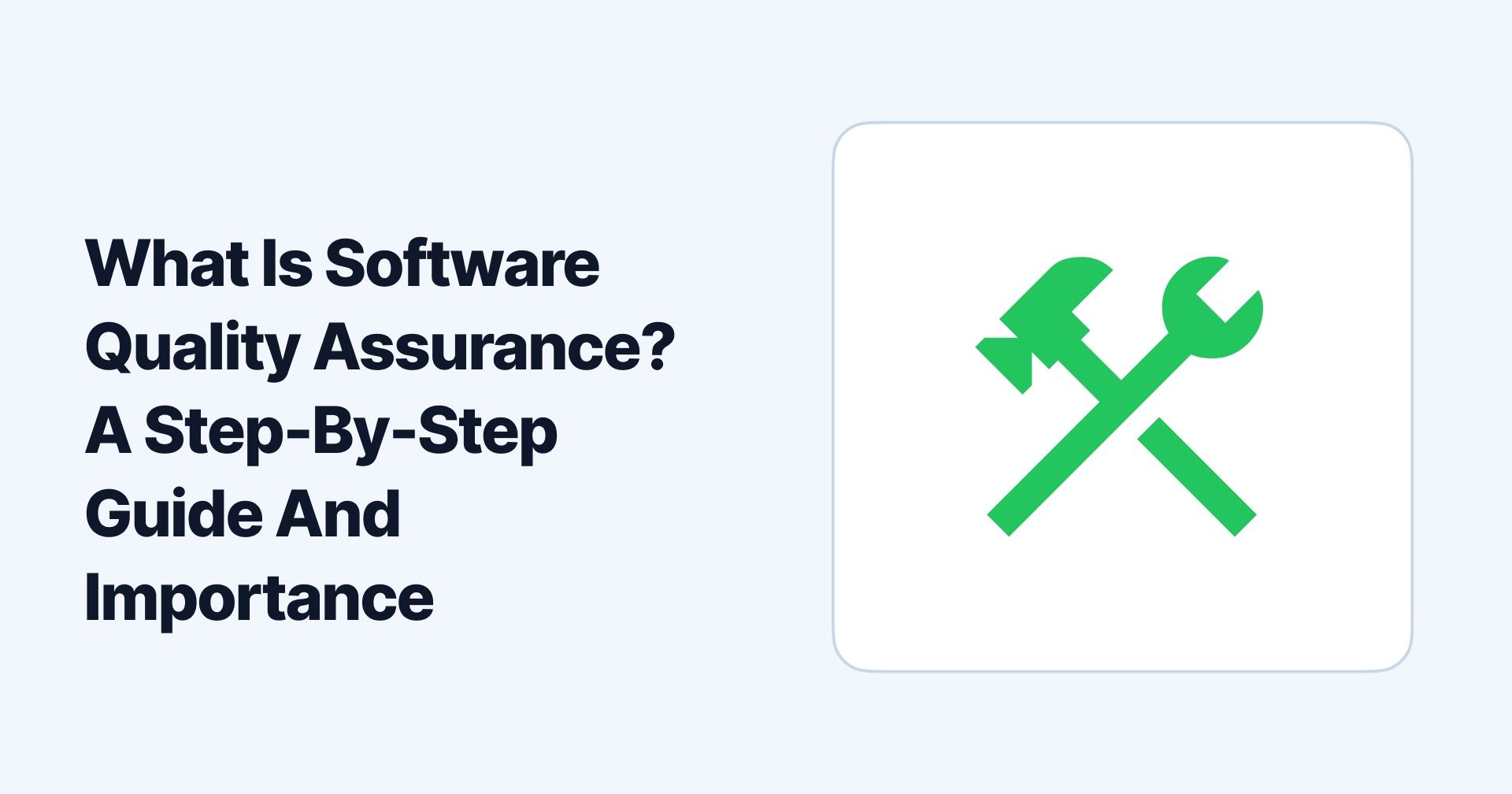
The world of software testing is constantly evolving. To stay ahead of the curve, you must understand all the trends and technologies, and that’s where feature-rich automated software testing, QA testing tools come into use.
Top Automated Tools for Software Testing allow you to test your software quickly and efficiently without worrying about human error. In this blog post, we'll discuss the best test automation tools in 2023.
We will also briefly describe each tool and how it can help you improve your software testing process.
So, let's get started.
An Overview of Automation Tools
Automated Tools for Software Testing are incredibly useful for streamlining the process. In automated testing, automated tools run tests and compare the actual results against the expected outcomes.

Automated testing is invaluable in reducing time spent on repetitive manual tests, as automated processes can be repeated quickly and consistently with minimal human effort.
These tools have a variety of uses in software development and testing. For instance, they can be used to develop automated test scripts; analyze code coverage; detect defects; record system logs; monitor performance; and generate automated reports.
Furthermore, test automation tools provide an efficient way of running regression tests to ensure that existing functionality is not broken when changes are made to the codebase or environment.
This reduces the risk of introducing bugs that could have otherwise been caught earlier in the development cycle.
Benefits of Using Automated Tools
Besides streamlining business operations, there are many other benefits of using automated tools for software testing. Let’s find out what they are.
• Efficiency: Test automation tools help increase your business operations' efficiency by reducing redundant manual tasks and eliminating human error.
This helps to reduce the time it takes for a task to be completed, allowing you to focus on higher-priority tasks.
• Cost Savings: Automated tools also enable greater cost savings as they help to reduce labour costs as fewer staff members are required for a task or project.
In some cases, automated tools for software testing can eliminate a process that would otherwise need manual labour, resulting in significant cost savings.
• Accuracy: When you use automated tools, there is less chance of human error and, thus, more data processing and analysis accuracy.
For example, when using an automated tool for data analysis, the results are more reliable than manual calculations.
• Productivity: Automated tools help boost productivity by freeing employees from mundane tasks and allowing them to focus on more crucial tasks that require higher levels of skill or creativity.
This can positively affect your business's overall productivity in terms of quality and output. Overall, utilising automated tools helps businesses to run more efficiently and cost-effectively while ensuring accurate results with minimal human intervention.
By leveraging these benefits, companies can enjoy a competitive edge over their rivals and gain an advantage in today’s ever-changing business landscape. Top Automated Tools for Software Testing Mentioned below are the major automated testing for software testing:
1. Allure TestOps
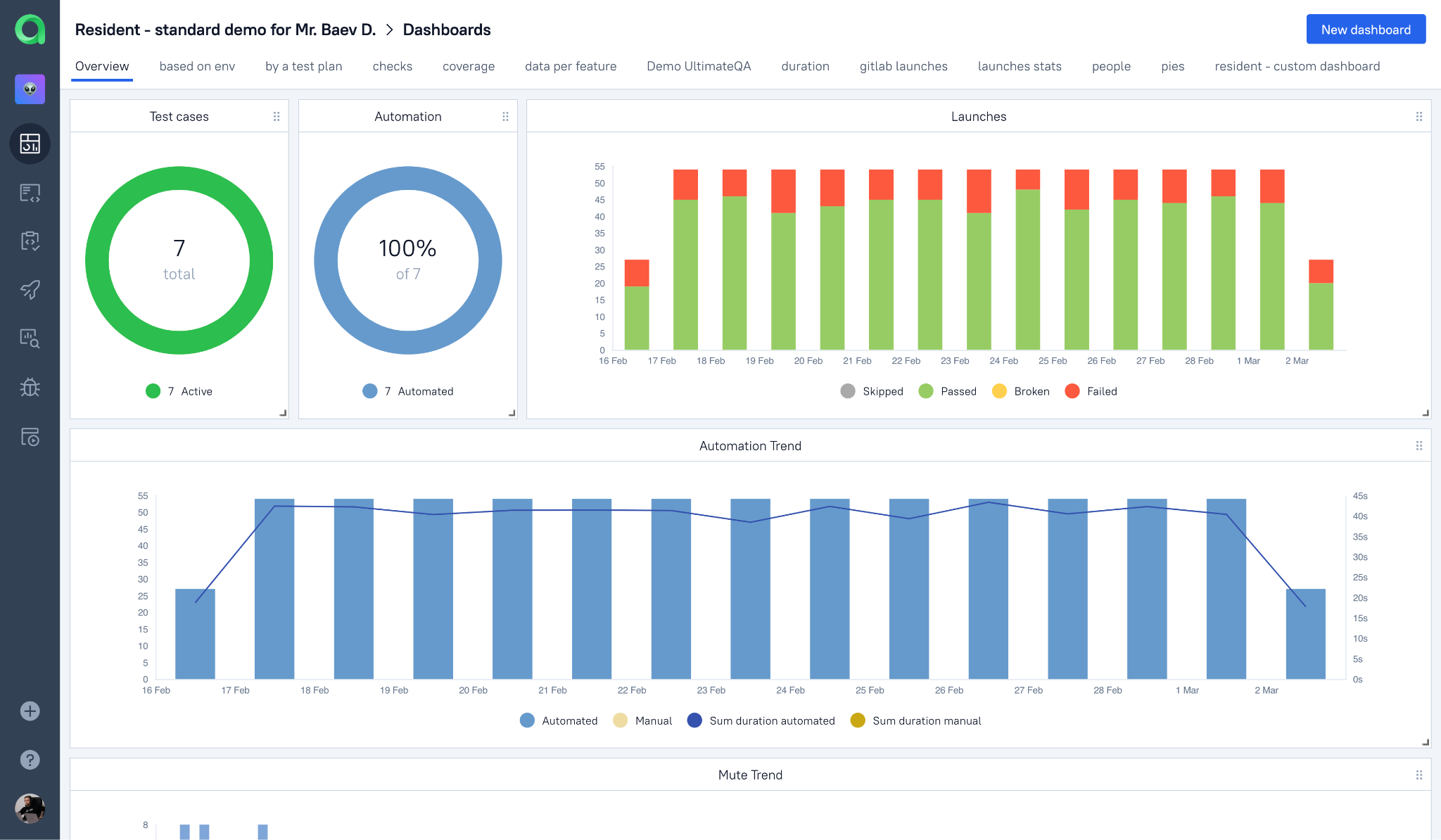
Allure TestOps is a revolutionary multi-language testing report tool that integrates manual and automated test reports together to deliver seamless test run results for boosting your team’s productivity. It offers users an extensive range of features that allow them the flexibility to customise their reports according to their needs.
This tool is a lightweight, highly versatile and innovative solution for automated software testing, greatly favored by the community. The Allure TestOps Software team works hard at maintaining the product and providing technical support whenever needed.
The cutting-edge testing tool assists in creating detailed reports by merging the test results obtained from the different test execution cycles. The results are presented in graphs and charts, which are easy to understand and analyse.
This helps quickly identify any operational bottlenecks issues such as feedback loops or duration issues (slow turnaround times) that need immediate attention and fix. Allure TestOps also provides users an integrated platform for testing, tracking, analysing, and reporting their software products.
Pros: • Enjoy complete visibility with real-time insights via the platform’s robust dashboards and reporting tools. • Get a single comprehensive report with multiple test runs enclosing details on all components required for the release. • User-friendly and intuitive interface makes Allure TestOps an easy to use platform for all. • The support services are quite impressive. • Easy to manage the test results.
Cons: • Limited free trial period.
2. Testsigma
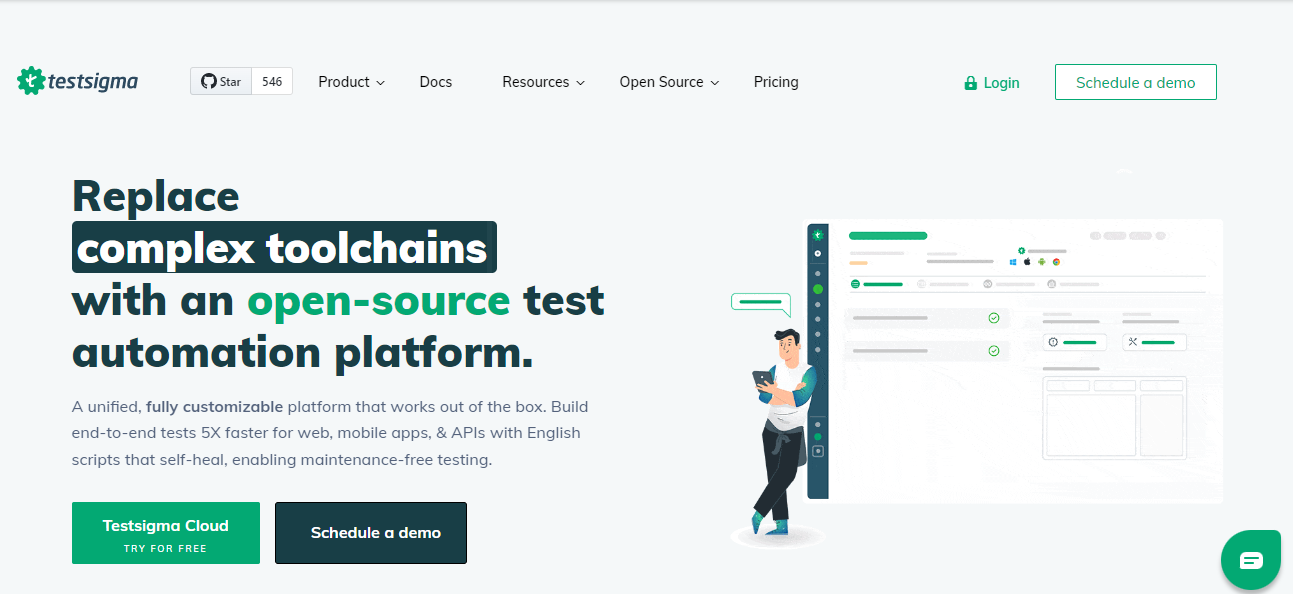
Testsigma – one of the best automated tools for software testing – makes it to the list for their simplified software testing procedure that enables users to quickly create, execute, and monitor tests with minimal effort. The software is primarily designed for modern and agile development teams.
Testsigma supports a wide range of test types, including regression testing, cross-browser testing, continuous testing and data-driven testing, so your team can quickly identify any issues before they become bigger problems.
With its artificial intelligence capabilities, Testsigma can understand natural language instructions, helping to make the entire process much easier. Plus, it's cloud-based, so you don't need to download or configure any hardware.
With Testsigma, you'll have peace of mind knowing every aspect of your software is thoroughly tested in the shortest possible period. It also helps you save valuable resources by giving your team more efficient and quicker results.
Testsigma is easy to use and comes with comprehensive documentation to get up and running quickly. Plus, its intuitive dashboard makes tracking progress easier than ever before.
Pros: • Excellent for automating repetitive tests and processes that involve minimal configuration requirements. • Good project management tool with a 24/7 available customer support service. • Allows seamless feedback management with its cutting-edge software technology. • Does not require professional support to resolve issues. • Great for repetitive test automation.
Cons: • The platform doesn’t allow users to link test suites. You’ll need multiple parallel user accounts to execute this function. • At times, it is hard to achieve consistency in the test cases.
3. Katalon Studio
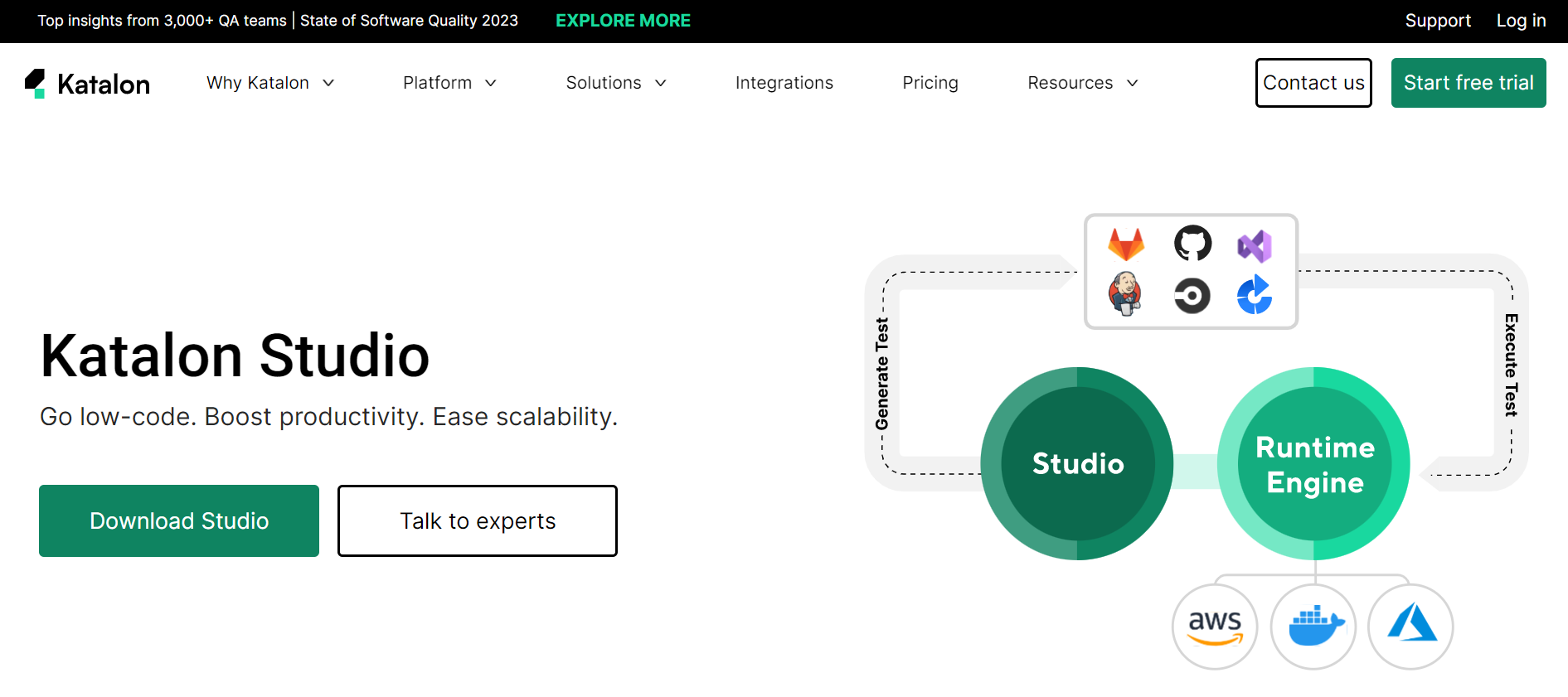
Katalon Studio ranks amongst the top automated tools for software testing designed to streamline software testing processes.
It's based on two of the most powerful and widely used frameworks in test automation - Appium and Selenium - making it the perfect choice for testers looking to reduce time, stress, and cost while improving their product quality.
Katalon Studio offers a flexible execution procedure and a dual-editor interface, making it much easier to overcome typical web UI test challenges.
This great tool can also be integrated with popular tools such as Slack, Kobiton, JIRA, qTest, and Git so testers can access even more test capabilities.
Pros: • Seamless integration with DevOps/CI workflows and other relevant tools • Built-in, data-driven and intuitive reports and analytic dashboards. • Supports data-driven testing, API testing, cross-browser testing, and keywords-driven testing. • User-friendly and seamless GUI. • The learning curve is mild with a lot of learning resources available.
Cons: • Limited scripting language is its only downside as the platform only use Groovy as its scripting language. • It is not open-source.
4. Cucumber
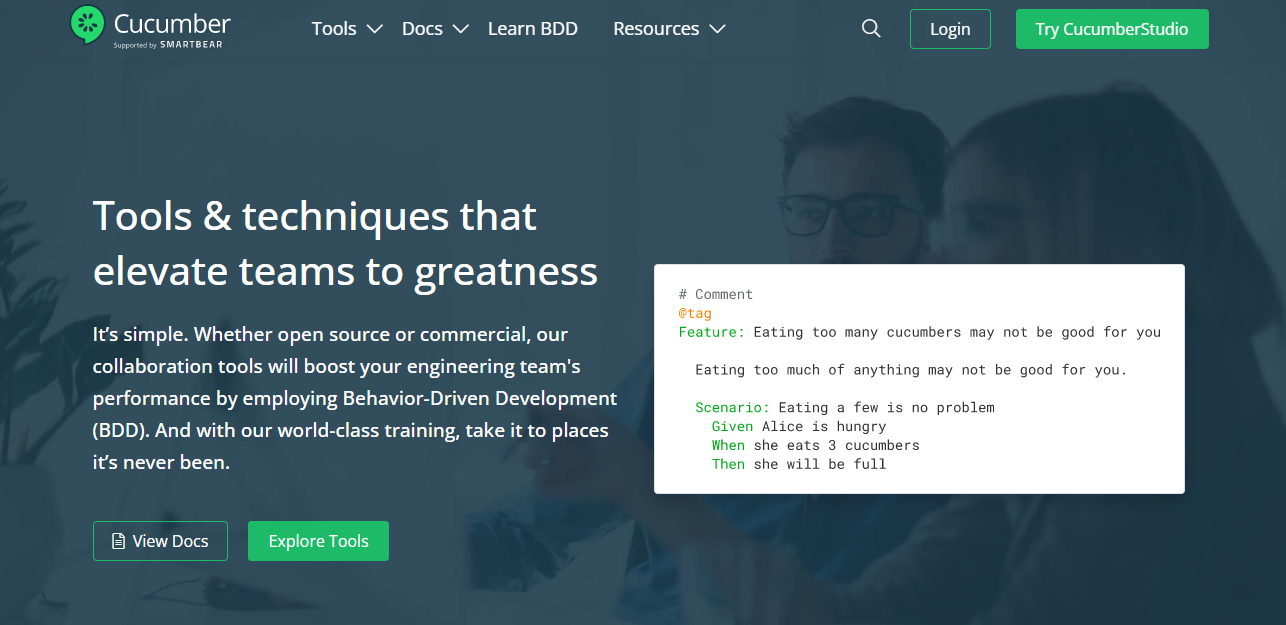
Cucumber is a revolutionary behaviour-driven development (BDD) tool that helps software testers deliver superior user experiences.
This open-source platform supports numerous frameworks, including Ruby, Groovy, Selenium and Scala, and several popular programming languages like Ruby, Java and Groovy.
With Cucumber, QA testers can develop test cases and scenarios quickly and easily with the help of Gherkin syntax. These features make it an ideal testing solution for anyone who prioritises enhancing the end-user experience above all else.
When using Cucumber to test software applications, developers can create automated tests that are easy to read, understand and maintain over time.
Cucumber tests are more descriptive and detailed than traditional unit tests by focusing on user stories. As well as speeding up the testing process, this tool simplifies creating automated acceptance tests.
Pros: • Intuitive platform that helps businesses portray their requirements in human-readable forms. • Supports multiple programming languages, including JavaScript, Java, Ruby, etc. • Seamless transition of your business needs into concise testable scenarios. • Simple usage and has a huge community of users. • Simple syntax for testers.
Cons: • The use of Gherkin's language makes the platform more cumbersome and complex. • Not appropriate for first-time QA testers.
5. TestingWhiz

TestingWhiz is an all-in-one automated testing solution that provides comprehensive software and mobile applications coverage. It’s designed to save time and money in the testing process, with a codeless interface and data-driven approach.
No coding or scripting knowledge is required - point and click! TestingWhiz supports many test types, such as API, online & mobile app, database, regression, and cross-browser tests.
This ensures complete coverage of the application under test. It also integrates with popular test management solutions like HP Quality Center, TestRail, Zephyr & MS VSTS, and bug-tracking tools like Mantis, FogBugz, Jira & TFS.
TestingWhiz additionally supports various features, such as record & replay functions, test case builders and keyword-driven architecture.
This makes it easy to create and execute tests quickly and efficiently. It is a time saver in the testing process and eliminates the need for manual scripting work.
Pros: • Availability of record and play feature allows users to save the development time of the script. • A single test case in this platform is capable of performing end-to-end testing. • Readily available commands makes it easier for users to build modular automation scripts on this software. • Centralized modules for maintaining test scripts. • Availability of trend analysis reports.
Cons: • iOS recording is absent in this testing automation tool.
6. Appium
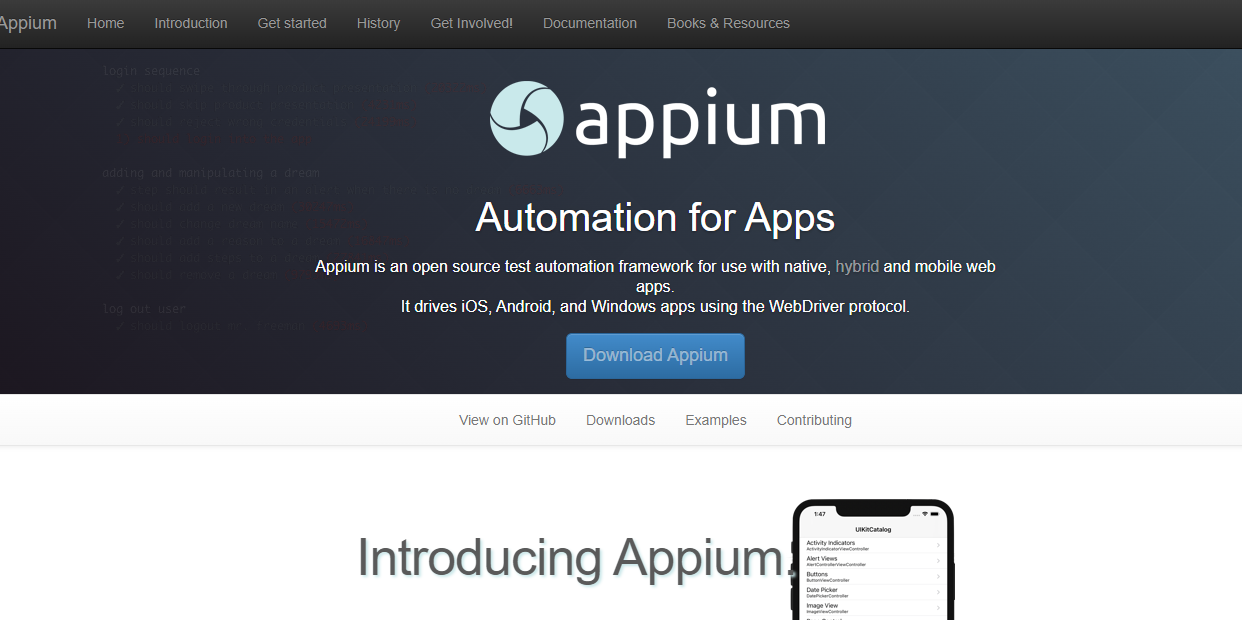
Appium is a rapidly-growing open source mobile automation testing solution, empowering developers to test native applications without needing an SDK or recompilation.
Appium’s methodology allows users to seamlessly and effectively test native, hybrid and mobile apps.
This pioneering tool has quickly become one of the top automated testing tools. It cuts out tedious processes that can be time-consuming and potentially costly in terms of resources.
What makes Appium stand out from other similar solutions? Many developers prefer Appium as it provides unparalleled flexibility – you don’t need to utilise an SDK or modify your existing application code to use it.
Pros: • Cross-platform availability for native and hybrid mobile applications • Users can contribute to the platform easily as its an open-source platform • Enjoy writing and running tests using any type of test language or framework. • Appium offers support for the JSON wire protocol. • Does not depend on mobile devices.
Cons: • There is limited support to test hybrid mobile applications. • Appium inspector cannot be run on MS Windows.
7. LambdaTest
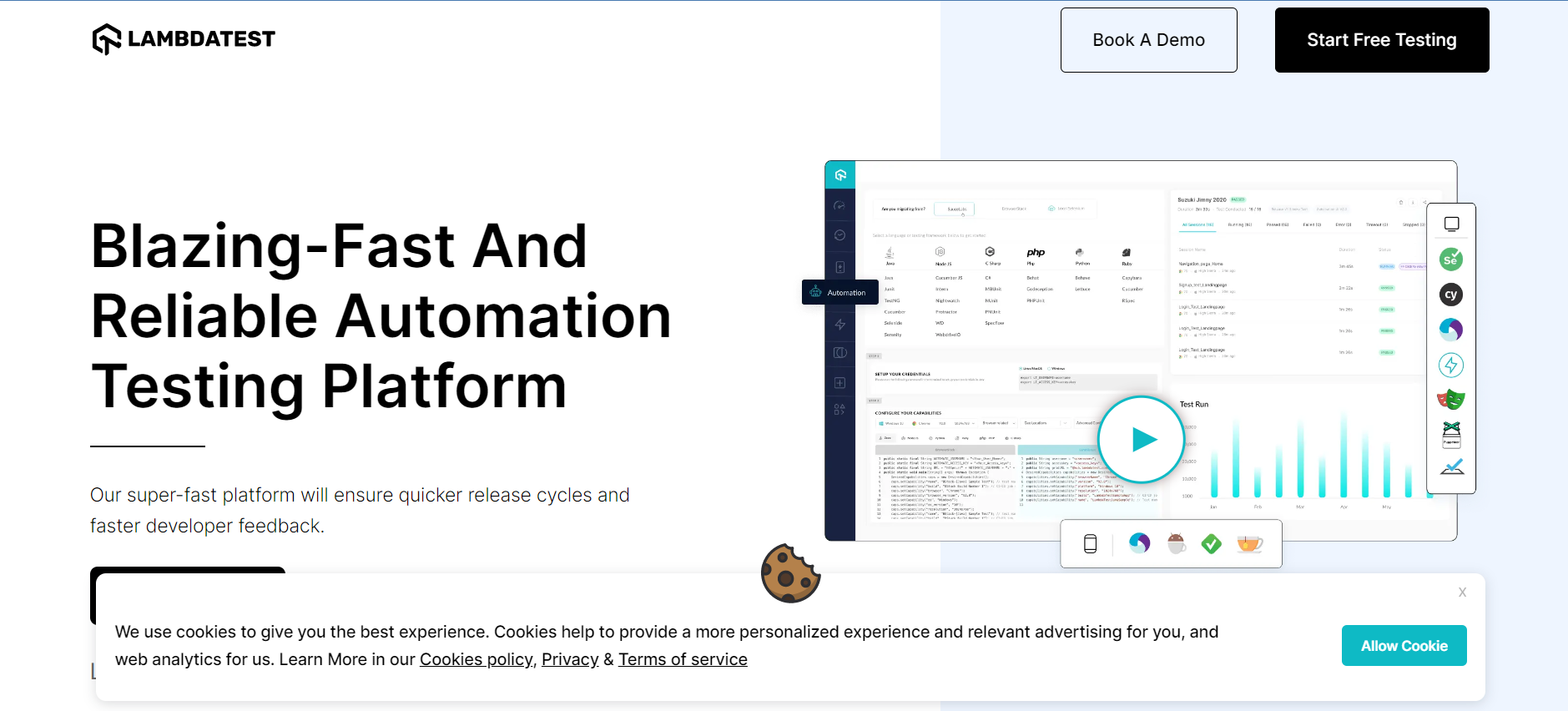
LambdaTest is an automated software testing tool providing its users unparalleled convenience and precision.
It allows for cross-platform web and application testing using over 2,000 different web browser settings. This enables you to quickly and accurately test your applications in multiple versions of various browsers.
LambdaTest boasts efficient snapshot testing on 25 combinations at once, leveraging Selenium Grid and framework's capacity.
Moreover, this tool is accessible without any coding expertise or background—perfect for those just beginning to dip their toes in software development.
Additionally, its various third-party integration options offer you more features that will help meet your specific needs.
Pros: • Run multiple parallel tests for seamless testing • One of the best automation tools for software testing that works efficiently via API • Quick, simple, and convenient manual debugging • Easy to understand, operate, and configure • Seamless collaboration and configuration in one place.
Cons: • Limited number of available devices for testing. • Lags while operating in virtual machine.
8. Tosca
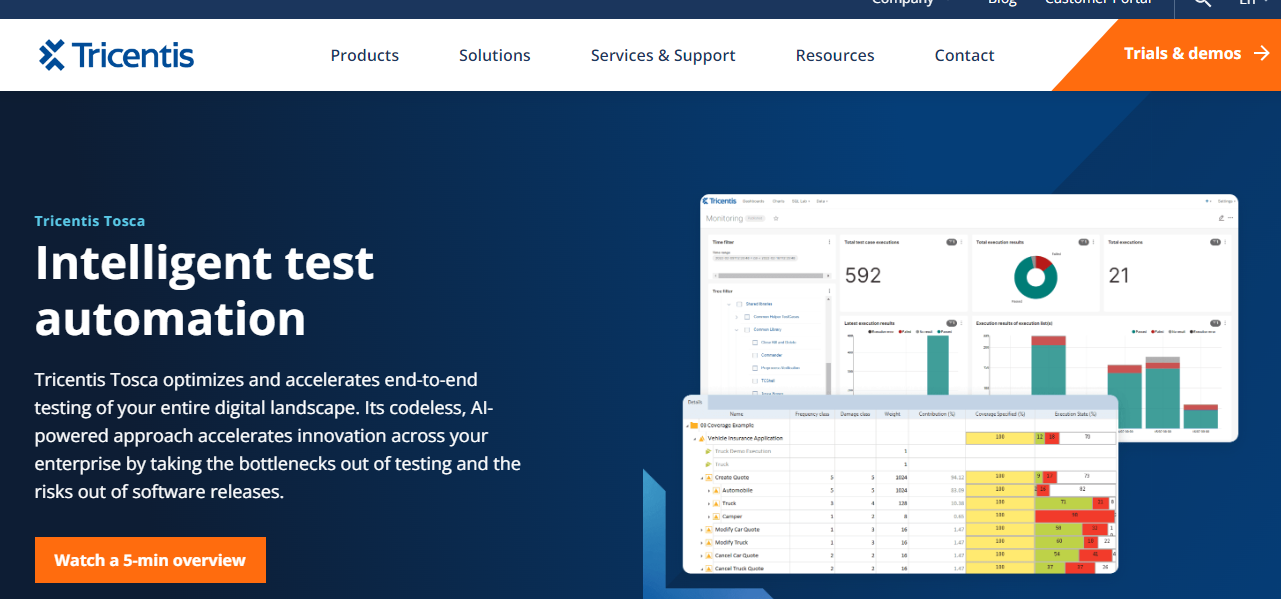
Tosca is an effective automated testing tool to ensure software applications' quality and reliability. It provides users with powerful features that allow them to quickly and efficiently test their applications for any bugs and errors.
With Tosca, users can easily script tests, manage test cases, customise user interfaces and track system performance. Moreover, it supports various technologies and applications, making it one of the top choices for automated testing in 2023.
With its advanced capabilities, Tosca makes software testing efficient and cost-effective. No matter the type of software you’re developing or the complexity of your application, Tosca has you covered with its comprehensive test automation solution.
Its intuitive design and automated testing features will help streamline any project while providing reliable results every time!
Pros: • The platform comes with a simple, user-friendly and intuitive interface at a reasonable price. • Get quick testing results and regular updates via notification. • Leverages agile testing methodology to make the platform ideal for testing large and small scale applications. • Automated testing features for smooth operations. • Online support available for operational hassles.
Cons: • Needs improvement on AI-based insights. • No programming available, so difficult to create loopings.
9. Cypress
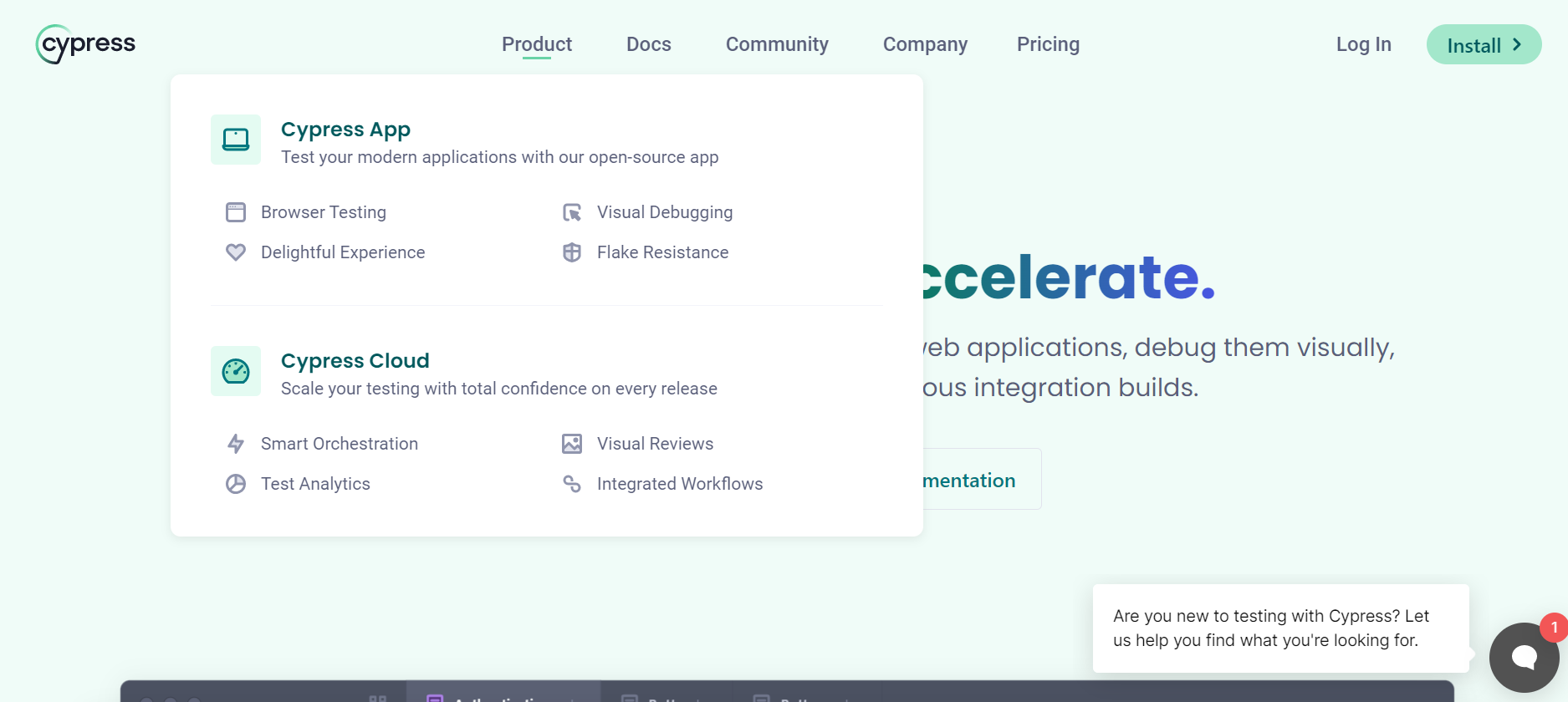
Cypress is an open-source test automation tool which simplifies and quickens web application testing. The JavaScript runtime environment makes it easier for developers who understand this programming language.
This program offers many powerful features like speedy and dependable tests, real-time reloading capabilities, time-travel debugging abilities, an automatic waiting system, and effortless setup options to ensure users get up and running quickly!
This powerful automated testing tool lets users quickly set up tests within minutes and run them in parallel across multiple environments. This means that users can enjoy fast results from their tests at any time without waiting long periods.
Furthermore, Cypress’s automatic waiting capability eliminates any delays caused by slow network conditions, thus providing users with a highly reliable and efficient platform for testing.
Moreover, Cypress has an intuitive time-travel debugger which helps users gain insight into their test results and identify any issues that may have occurred during the execution of tests.
With this feature, users can easily fix any bugs or problems in their applications before they go live.
Pros: • Before any action, the software’s automatic scrolling operation makes sure the element is in view. • Supports mobile testing and allows third-party tool integration. • Allows cross-browser testing and loads test without any hassle • Automatic wait-time ingrained in the codes to wait for elements. • You don’t need an additional IDE for Cypress to function.
Cons: • Does not support Apple Safari. • No direct support for other tabs and windows.
10. Karate

Karate simplifies creating and preserving API tests with no coding literacy by relying on Cucumber as its framework.
This open-source test automation tool for API testing allows users to utilise Gherkin, an easily understandable language, enabling them to create robust automated tests quickly.
Karate is designed to decrease the time it takes to write and maintain tests and integrate into DevOps processes.
It also has a built-in reporting feature that can be used with CI/CD pipelines, allowing users to review test reports and make informed decisions quickly.
The ability of Karate to work across multiple programming languages makes it a great option for software testers who need an automated tool that works on various platforms.
Additionally, its ability to generate HTML or JSON reports helps accelerate testing by providing quick feedback on test results.
Pros: • Minimal coding requirement makes it an easy to use platform for beginners • Robust and efficient JSON validation • Allows performance testing with the integration of the Gatling framework. • Users can find a parallel multi-thread execution. • Karate supports JavaScript coding.
Cons: • Complex to find errors or bugs in your code. • Uses its own intrinsic code.
About Allure TestOps

Allure TestOps is one of the best automated tools for software testing designed to help organisations achieve continuous integration and continuous delivery (CI/CD).
With Allure TestOps efficient user interface, users can easily define test cases and manage their scripts effortlessly.
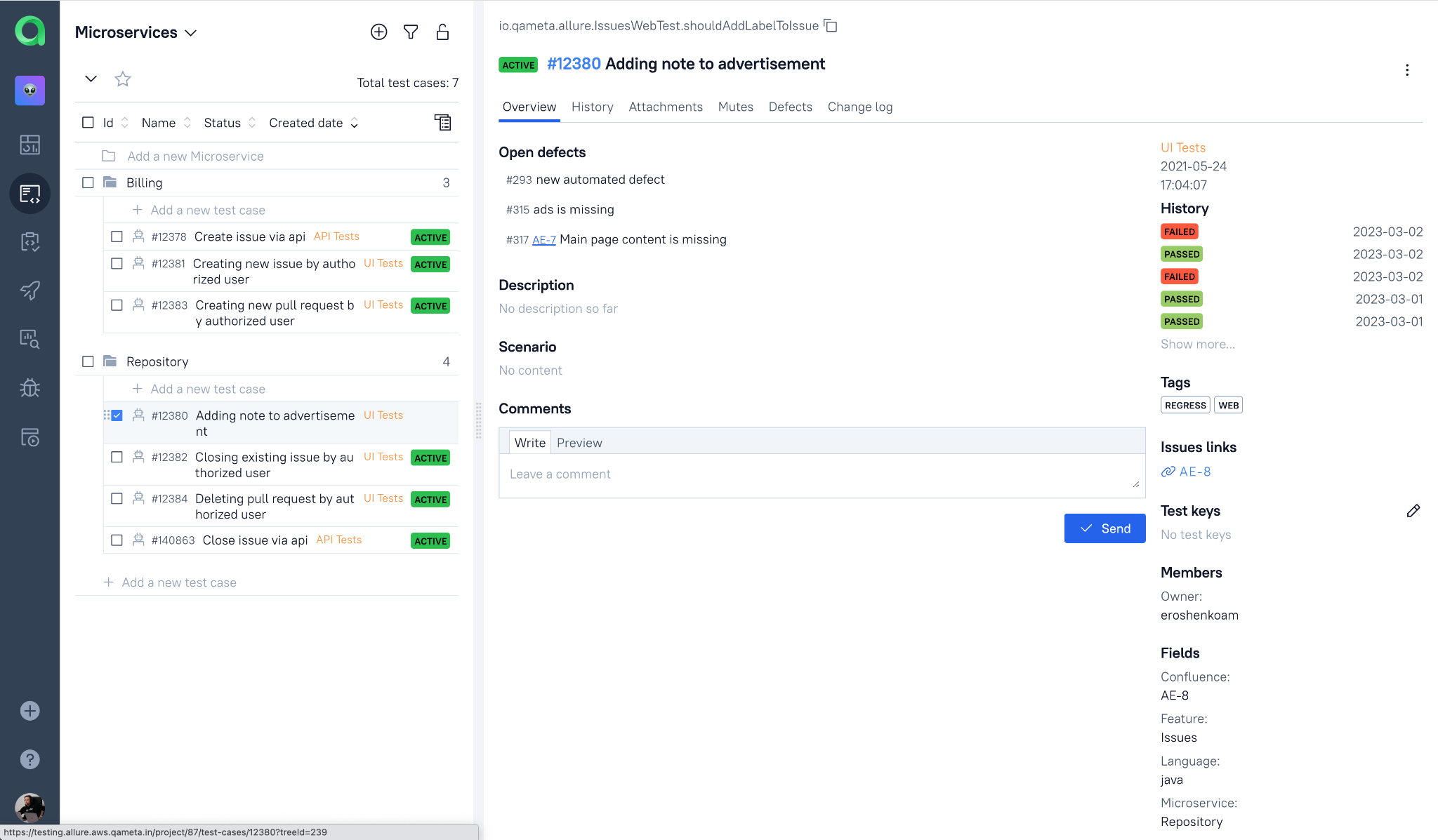
Additionally, this powerful platform allows you to quickly analyse results and automate execution of test suites across multiple browsers or platforms for a comprehensive end-to-end functional testing experience.
With its advanced capabilities, Allure TestOps can empower your organisation to build reliable software faster by streamlining your quality assurance process and reducing manual labour costs in the long run.
The Bottom Line
The continuous evolution of software testing automation tools means that teams can access more efficient methods than ever before.
Out of all the best automated tools for software testing available, the top 10 list for 2023 shows a clear trend towards continuous testing and functional testing solutions.
With such an array of automated solutions available, it’s never been easier to ensure your applications are tested quickly, thoroughly and cost-effectively. Amid all the options, Allure TestOps stands to be the leading choice among business enterprises.
Not only will you get dynamic and sustainable testing solutions at affordable prices, but all the necessary functional testing capabilities for continuous development and deployment.
Click here and explore the realm of the best automation testing tool in the digital landscape – Allure TestOps.
